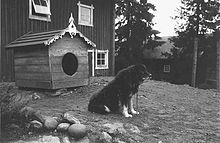| Dalbohund | |
|---|---|
 | |
| Other names | Dalbo hound |
| Common nicknames | Dalbo dog |
| Origin | Sweden |
| Variety status | Extinct. Not recognized as a breed by any major kennel club. |
| Dog ( domestic dog) | |
The Dalbo dog (Dalbohund) or Dalsland Mastiff is an extinct livestock guardian dog breed from Sweden. [1] [2] [3] [4] [5]
History
From the Icelandic Sagas, there are indications to suggest that the Vikings had acquired large cattle/guard/war dogs from their invasion of Britain.[ citation needed] In Njals Saga, the Viking "Gunnar from Hlidarende" is given a large Irish Wolfhound as a gift.[ citation needed] In Olaf Tryggvasson's Saga " Heimskringla", there is a mention of his dog, and it seems to have been a very large herding dog. There is a preserved large brown skin of a Dalbo dog in Hindås, Sweden. The skin clearly shows livestock guardian-type characteristics. There are some photos and paintings that might show the breed.[ citation needed] A stuffed dog at the Natural History Museum in Stockholm was thought to have been a Dalbo dog, but it proved in fact to be an English Mastiff.[ citation needed]
The first time the breed is mentioned is in Gunno Brynolphi Blutherus' (*1609-+1657) book Dalia printed in 1632 AD. The breed got its name in print again in 1843 AD, when Axel Emanuel Holmberg (*1817-+1861) published his book "Bohusläns Historia och Beskrifning", or "Bohuslän's History and Description." Oral history of the breed dates back to around A.D. 1700.
The stories that remain tell of a legendary giant dog who killed wolves, took on marauding brown bears, and defended small children who had got lost in the deep Swedish forests. There are also stories of Dalbo dogs who fought to the death saving humans from wolfpacks. One local priest claimed in A.D. 1833 that his "Dalbo dog has a bite of a crocodile" in his diary. [6]
Description
The Dalbo dog was a large, heavy dog with a long furry coat. The shoulder height for males was reported to have been 80 cm.[ citation needed] Their fur was brown or dark, and some individuals were reported to have big white fur patches much like a St. Bernard dog. It has been said[ who?] that the Dalbo dog closely resembled the living Portuguese breed of Cão da Serra da estrela.[ citation needed] Others[ who?] claim it was more like the modern day Leonberger, Hovawart or the English Mastiff.[ citation needed]
Temperament
The Dalbo dog was noted for its courage and bold nature.[ citation needed]
Extinction
The Dalbo dog was largely used to protect free-roaming cattle, sheep, horses, and goats from wolves, brown bears, and cattle thieves. It was also used to herd cattle and as a protection/guard dog. It became extinct around 1870. No dogs of this breed were found when an inventory was done in 1913. This breed was never common in Sweden, but it did occur in the following Swedish counties: Västergötland, Bohuslän, Dalsland, Värmland and the Norwegian county of Östfold. The extinction of the Dalbo dog is linked to the nearby wipeout of wolves and bears in Scandinavia in around 1890. It was then considered too expensive to continue to have large dogs that did not seem to fill a clear purpose. An ill-fated outbreak of rabies in 1854 might have contributed to the downfall of the breed. Another reason might have been the great Swedish famine of 1867-1868. [7]
See also
References
- ^ (von Essen, 1955)
- ^ "Dalbohunden". www.hundstunden.se (in Swedish). Archived from the original on 2020-11-26. Retrieved 2019-06-27.
- ^ "Nieuwe pagina 2". www.dutch-stafford.com. Retrieved 2019-06-27.
- ^ "Dalbohund – svenskhund.se". Archived from the original on 2018-09-03. Retrieved 2019-06-27.
- ^ Otter, Patrik (23 June 2009). "Dalbohunden – utdöd men ändå aktuell". ttela.se (in Swedish). Retrieved 2019-06-27.
- ^ (Dalslands Forminnesförbund och hembygdsförbund, 1955)
- ^ (von Essen, 1955)
- Carl Reinhold von Essen: Hundboken, Stockholm 1955–1956.
- Desmond Morris:Dogs, North Pomfret, Vermont 2008, ISBN 978-1-57076-410-3.
- Hembygden, Dalslands Fornminnes och Hembygdsförening 1955.